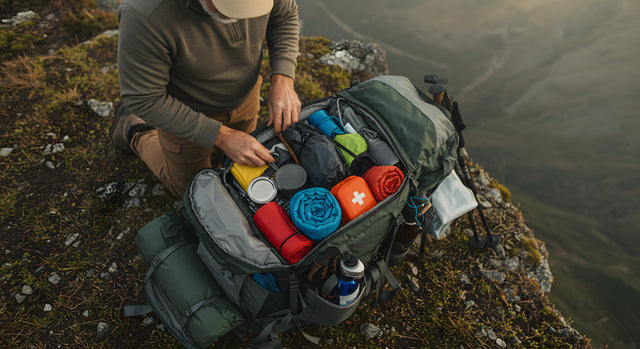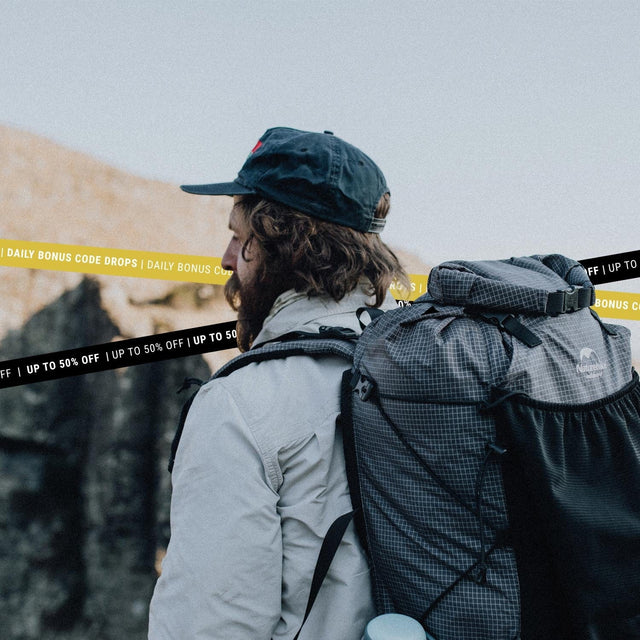Naturehike's Hiking Gear Checklist
There are only two things South Africans love more than hiking: rugby and biltong. Unlike those two things, hiking is a bit of a struggle to enjoy without proper planning. The best way to make sure that you have not forgotten anything is to use a hiking gear checklist.
How to Use This Checklist
Veterans or newcomers will find value in the checklist. As the saying goes, "failing to plan is planning to fail", and we want to help you plan for a safe and enjoyable trip. This hiking gear checklist is designed for hikers of all experience levels, with particular attention to newcomers who might feel overwhelmed by the packing process. Having a successful hiking trip lies in balancing preparation with pack weight.
Consider these factors when packing:
-
Hike's duration: A 2-hour day hike requires different gear than multiday hikes
-
Weather conditions: Check forecasts and prepare for changes
-
Terrain type: Rocky terrain and rough terrain demand sturdier hiking footwear
-
Your body weight and fitness level: Pack weight should generally not exceed 20% of your body mass
-
Experience level: First-time hikers should prioritise safety over ultralight gear
For cold-weather hiking, you'll need additional layers and emergency essentials. Warmer weather calls for increased sun protection and hydration considerations. Always research trail conditions before heading out and adjust this packing list accordingly.
Don't forget to download multiday Naturehike's gear checklist for an even more detailed breakdown of gear recommendations.
Essential Hiking Gear Checklist
The Big Three
Backpack & Carrying
-
☐ Day pack (20-30L for day hikes, 40-60L for overnight hikes)
-
☐ Small pack or hip pack for essentials
-
☐ Pack cover (to keep gear dry in wet conditions)
Hiking Footwear
-
☐ Hiking boots (for rough terrain and ankle support)
-
☐ Trail running shoes (lightweight option for easier trails)
-
☐ Trail runners (fast-drying for stream crossings)
-
☐ Appropriate footwear for terrain and weather conditions
-
☐ Quality hiking socks (wool or synthetic, avoid cotton)
Clothing System
-
☐ Moisture-wicking base layer
-
☐ Hiking pants or shorts
-
☐ T-shirts
-
☐ Extra layer for temperature changes
-
☐ Extra clothes (spare socks and underwear)
-
☐ Extra clothing for emergencies
Weather Protection
-
☐ Rain jacket (essential for all hikes)
-
☐ Lightweight jacket or windbreaker
-
☐ Down jacket (for cold-weather hiking)
-
☐ Sun protection (hat, sunglasses, long sleeves)
-
☐ Lip balm with SPF
-
☐ Sunscreen for sun exposure protection
Safety & Emergency Essentials
Navigation & Communication
-
☐ Map and compass if you're old school
-
☐ Cell phone with offline maps
-
☐ Emergency whistle
First Aid & Safety
-
☐ First aid kit with basic supplies
-
☐ First aid supplies including bandages
-
☐ Antiseptic wipes
-
☐ Personal medications
-
☐ Emergency blanket (compact and lightweight)
-
☐ Emergency shelter for unexpected nights out
Tools & Utilities
-
☐ Headlamp with extra batteries
-
☐ Multi-tool or knife
-
☐ Duct tape (small amount wrapped around trekking poles)
-
☐ Fire starter and waterproof matches
Hydration & Nutrition
Water
-
☐ Water bottle (at least 1L for shorter hikes)
-
☐ Hydration pack for longer hikes
-
☐ Water treatment tablets or filter (for multi-day adventures)
-
☐ Electrolyte supplements to stay hydrated
Food
-
☐ Trail mix for quick energy
-
☐ Granola bars or energy bars
-
☐ Lunch for full-day hikes
-
☐ Extra snacks for emergencies
-
☐ High-calorie foods for longer hikes
Mobility & Comfort
-
☐ Trekking poles (essential for rocky terrain and longer hikes)
-
☐ Hiking poles for added stability
-
☐ Comfortable daypack with proper fit
Personal Items
-
☐ Toilet paper and a towel
-
☐ Hand sanitiser
-
☐ Personal hygiene items
-
☐ Physical money and ID
-
☐ Camera for memories
Specialised Checklists by Hike Type
Overnight Backpacking Trip Additions
Sleeping Gear
-
☐ Sleeping bag rated for expected temperatures
-
☐ Sleeping pad or inflatable sleeping mat
-
☐ Sleeping mat for comfort and insulation
-
☐ Pillow or inflatable pillow
Shelter
-
☐ Tent or lightweight shelter
-
☐ Ground tarp
Cooking & Food
-
☐ Backpacking stove and fuel
-
☐ Cookware and utensils
-
☐ Dehydrated meals for easy preparation
-
☐ Bear canister or rope for food storage
Multiday Hikes & Long Distance Hikes
-
☐ Additional clothing layers
-
☐ More comprehensive first aid supplies
-
☐ Backup navigation tools
-
☐ Repair kit with extra gear
-
☐ Resupply planning materials
Cold Weather Hiking Extras
-
☐ Insulated jacket or vest
-
☐ Warm hat and gloves
-
☐ Insulated water bottle
-
☐ Hand and foot warmers
-
☐ Gaiters for snow protection
-
☐ Microspikes or crampons for icy conditions
Warmer Weather Additions
-
☐ Extra water capacity
-
☐ Cooling towel
-
☐ Insect repellent
-
☐ Lightweight, breathable clothing
-
☐ Sun hat with brim
Optional Items for Experienced Hikers
These items can enhance comfort but aren't essential for most hikes:
-
☐ Portable camp chair
-
☐ Binoculars for wildlife viewing
-
☐ Camera tripod
-
☐ Journal and pen
-
☐ Field guides
-
☐ Portable phone charger
-
☐ A few more items based on personal preferences
Final Packing Tips
Before every hike:
-
Check weather forecasts and trail conditions
-
Adjust this packing list based on your specific route
-
Test all gear before your first overnight backpacking trip
-
Consider the trail's difficulty and your experience level
-
Leave a trip plan with someone reliable
-
Practice the packing process at home
Weight considerations:
-
Aim for a total backpack weight of 15-20% of your body weight for day hikes
-
For overnight trips, 20-25% is acceptable for beginners
-
Every milligram matters on long-distance hikes
Remember, the best hiking checklist is one that's tailored to your specific needs, experience level, and the unique demands of your chosen trail. Start with these essentials, and as you gain experience, you'll develop your own preferences for gear and packing strategies.
Visit Naturehike's gear collection for high-quality, lightweight hiking essentials that won't weigh you down on the trail. Our backpacking gear will enhance your outdoor experience tenfold.



0 Comments
There are no comments for this article. Be the first one to leave a message!